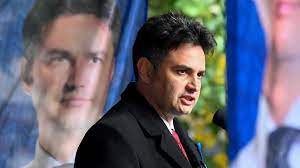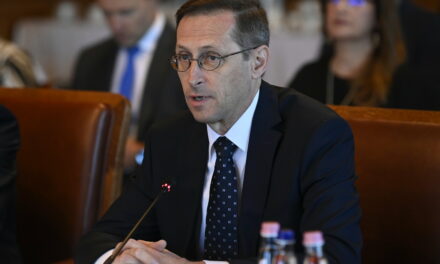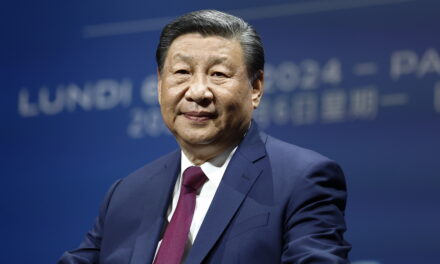Gergely Karácsony said, among many other things , that if he is elected prime minister, he will hold a press conference in English. Encouraged by this, I promise here and now to all dear readers that if they entrust me with their heart surgery, I will definitely report on my surgical skills afterwards. Or not, but then it won't matter.
"When I was younger, when I was a university student, I spoke a special kind of English, because I am a social researcher, and I had to read a lot and write a little in English," said Karácsony in the same interview, in response to the presenter's question, according to which "the special is more than the average, because then it's deeper?", he answered:
"It's a matter of point of view, it's such a technical language, so I understand tabloids less than scientific journals. And I can say that I will hold an international press conference in English after my election. Where I announce that Fudan University will not be built.”
Anyone who has ever studied or speaks English online knows exactly that what the Prime Minister-aspirant has put together here is - stylistically - bullshit .
On the other hand, we, right-wing voters who are stubbornly stuck in the triangle of ability-knowledge-performance, have to understand the Christmas phenomenon, which has nothing to do with reality. Next year will be a year of visceral elections, at least that is what the public mood suggests, but it is also safe to add that in the history of Hungarian politics, there has only been one such election in which the opposition won against a dominant party: in 1905. Following this election, the opposition only managed to get into government with difficulty in 1906, only to have this multi-party coalition government fail within a few years.
Regardless, we have to ask why it is possible that the sheer clumsiness, the lack of competences and performance, the do-nothing shown in Zugló and then in Budapest, according to some of the voters, is cute, but according to others, it is very cute.
Endre Kukorelly also said this in ATV , when asked if he supports the movement called Karácsony 99:
"Gergő is such an attractive person to me that there was no question at all, and when he told me, I said, of course."
And to the question that many people find Karácsony weak, and how he sees all this, he answered:
“He might not be so good in a cage fight. There are different party political or power strategies, there is the stone-hard cage fighter attitude, the advantage of which is that it is effective... then you realize that you don't want a cage fight... you can still win if you fight fairly, you don't necessarily have to deal and receive crazy wounds. That's what I see in him. Normal, fair guy. This is missing from society. Honesty is best. You have to talk to people normally, and Gergő knows that."
Endre Kukorelly is an excellent writer, and he cannot be accused of lacking the ability to think nuancedly. However, he switches to desire-driven mode under the influence of Karácsony, completely ignoring the facts, the real political weight of the candidate, and the force casting a shadow over him, which seized power in the Capital Assembly almost immediately after the municipal elections. He knows Gyurcsány's "democracy", and he should know that if he stands behind Karácsony, he is actually behind the DK.
Christmas was built so that it is not affected by its own actions. And so far it's worked for him. A civilian commenter evaluated the phenomenon as follows:
"If, in response to a question, she says twice in a row that listing Jews based on origin is not anti-Semitism, then after the monologue "the journalist provoked her with questions", the nonsense-laughing intelligentsia and her readership will accuse the reporter of character assassination.
Gergő can try to drill the LMP - Schiffer's narcissism took Gergő easily, because Gergő licks everyone, and then he goes nuts - but that's okay. You can betray twenty parties and twenty agreements, no problem. You can go down on a village day and campaign while hugging a Judaizer Nazi, no problem.
Tarlós, who is said to be from Mucsa, speaks Latin because of Gergő, it turns out that Szijjártó translates his conversational English for him. And then the opposition naysayers realize in a minute that language skills are not even important.
In 2018, one day before the election, he said that he believed in success, that he would win. Then three days later he boasted that 11 percent was a strong result. Vona fell by 20 percent, as did Szél. They made Gergő mayor.
Gergő survives everything. It survives because it represents nothing. He teams up with anyone, betrays anyone. Yet, in the end, he will always be the victim. He has a better relationship with Fidesz than Tarlós, but that's not a problem either. Nothing will touch it. He is the anti-Orbán, at least in the eyes of the inner-city aunties. If they ask him difficult questions, or highlight his betrayals, the fact that he has never followed through on anything he promised in a campaign or agreed with others, then it is character assassination. Gergő is the tall, soft boy with glasses, socks, sandals, combed hair, who betrays, whines, and plays with the girls, which is why the teachers always give him the truth. If you spy on your neighbor during the assignment, your neighbor will get one, because he must have been spying. After all, Gergő is such a smart boy, he would never cheat. And it turns out that Gergő is not a damn good student, not smart, but lazy. But he always wins with his image.
In 20 years, as an analyst or as a national politician, as the mayor of the only Hungarian city in the world, he was not able to learn a piece of a foreign language at a normal level, and the explanation for this is that he did not spend a semester at Oxford, like Orbán? And is that enough for intellectuals? The guy is a joke, but he still has a chance. That's why he has a chance. Any adult man or woman who can be taken seriously would have failed long ago because of the tithe that Gergő presents. But the expectations that apply to an adult, serious woman or man do not apply to Gergő."
This is the essence of the Christmas phenomenon, and next year's elections will reveal whether Hungarian society is able to decide its own destiny soberly and objectively, or whether it is embarking on a path that moves further and further away from reality. Of course, only until he feels the deadly embrace of Gyurcsány's "democracy" in Christmas decorations.













